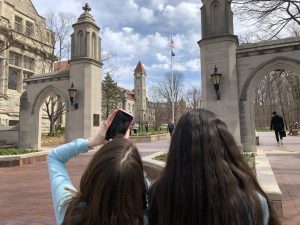Tips for the best college tour experience
Top Three Takeaways
- Let your student take the lead! Parents, stay quiet, during and after!
- Try to get a real feel for the college while you’re there.
- Be prepared for brain overload.
From the Pros
From Springfield Academic:
- Don’t be afraid to ask questions! Your tour guide will not know everything, so make sure to ask to speak to an admissions counselor before you go. If your student is a junior or senior, he or she should be asking questions. Make sure they are engaged in the process. If your child is not engaged, this may be a sign that the school may not be the right fit.
- Do make sure that if your child has any significant health issues or receives accommodations for an IEP or 504, make an appointment at Health Services and/or Disability Services to inquire about supports.
- Do not brag about your child to any school staff or ask about your child’s chance of admission. Create an experience where your child can take charge and ask questions.
From Scott E. Queener, Ph.D., Director, Student Success, Lincoln Land Community College:
- Do be sure to have your student ask questions during your tour as this is a great time to get detailed information about the college. Often times the tours are led by current students so you can get information and advice from a student perspective.
- At LLCC you can schedule an individual in-person tour at https://www.llcc.edu/explore-llcc/visit/tours/ or by calling 217-786-2422.
From Mary Beth Stephens, MBS College Coaching LLC:
- Do make sure your student takes charge of the college visit. Parents should NOT register their child for a visit.

- Do have the student check in at the college visit. I’ve cringed seeing parents talk while their senior HS students stands mutely to the side. .
- Students should pay attention to the tour guide. Do not take out your cell phone. The tour guide doesn’t know whether the student is taking notes, or playing Candy Crush.
- Parents – do walk further back on the tour. This isn’t your college, even if you’re an alumnus or alumna. This is your child’s chance to get to know the place.
- Don’t cringe when your child is the only one who says they are undecided on a major. It’s okay for them not to know.
- Do look around at the campus – do you see yourself walking down the sidewalks? Do you see yourself talking to the students? Where are the dorms in relation to the academic buildings? How do you feel about that? Look at bulletin boards – what’s going on around campus? How do you feel about those offerings?
- Do grab the student newspaper. What are issues on campus? How do you feel about what they’re saying?
From the Moms
From Denise Beauman:
- Do go when the college offers open house tours. That is when you get a “real feel” of the students, the campus and college life.
- Do let your child be the lead. Let them ask the questions. With that said, before the tour talk about good questions to ask and information you and your child want to know.
- If you go when the college offers Open House and you have options of different sessions about the school to attend, again let your kid take the lead.
From Angela Try:
- Do consider how much you need to do during the tour. If it’s a school where they are only slightly interested – just take the generic tour. But if your son/daughter is seriously considering them – then contact the Admissions Counselor for your area. Doing this gave us more one-on-one time with department chairs, student ambassadors etc.

- Let your student lead and ask questions. If you need a question answered feed it to your student to ask. Unless you’re in a “parents only” session – then ask away because they’ll never know!
From Lisa Whelpley:
- Do opt for individual meetings. The best college tours we experienced were one-on-one with a student and our family. Some universities do that as a matter of course, and others have giant tours where you can hardly hear the student guide. If there’s an option to visit the college or department in addition to the main tour, encourage your child to sign up for both. Also if there’s an option to have a one-on-one meeting with an admissions counselor after the tour, sign up for that. Another option is to choose a tour date when the specific department where your child wants to major has an open house and go then. Every time we did this, we ended up just one or two other students and their families (or, in the case of two schools, we had one-on-one meetings with a facullty member from the department).
- Do have your child prepare. The day before each college tour, we gave our son some time to read up on the college we’d be visiting so that he could make a list of questions to ask during the campus visit.
- Don’t ask questions on the tour. That’s the student’s job, not the parents’ job.
- Do write down the names of everyone you meet. Then, encourage your child to send thank-you letters to all who met with you during the campus visit. Hand-written note cards in most instances, sent via U.S. mail, or emails to college students that met with you or led the tours.
- Do give your child time after the campus visit. For our son, it was draining to be “on” for a long period of time, and we all needed time to decompress.
- Don’t offer your opinion of the university after the tour. Your student doesn’t want or need your opinion at this point in the process.
- Do ask your child to write a list of pros and cons, as soon as possible after the tour. It’s easy to forget things if you don’t write it down!
From Julie Kaiser:
- Resist the urge to handle all the details.
- Do keep track of all the paper. A key is to keep your high school student from feeling totally overwhelmed by all the information and marketing the college throws at you before and during the tour. If you corral the paper, that is one less thing for the student to worry about.
- Don’t ask a lot of questions. Let your student step out and inquire.
- Don’t share your opinions unless asked. And be prepared to not be asked.
- Do be prepared for brain overload and add some off-campus time to recoup. Go for a hike; grab a bite to eat; visit a local museum or area of interest. Decompress.
- Don’t be surprised when the college doesn’t want you involved in the class scheduling process for freshmen. Don’t argue or insist on meeting with the academic advisor anyway. Let your student take control over the scheduling process. Advisors understand how to schedule students. They have far more experience with the average 18-year-old than you do. Let them do the hard work with your student.










